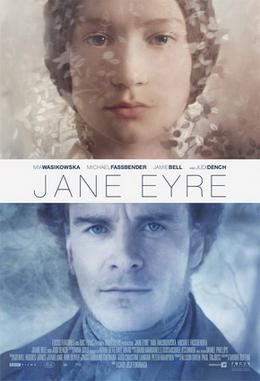To Eyre is Human
 - Charlotte Bronte's classic 1847 novel Jane Eyre has been brought to the screen both big and small so many times throughout the years that one doubts that a film can portray the story any differently than what has been done before. However, Cary Fukunaga's 2011 adaptation starring Mia Wasikowska, Michael Fassbender, Jamie Bell and Judi Dench features a very modern take on the story that yields both positive and negative results.
- Charlotte Bronte's classic 1847 novel Jane Eyre has been brought to the screen both big and small so many times throughout the years that one doubts that a film can portray the story any differently than what has been done before. However, Cary Fukunaga's 2011 adaptation starring Mia Wasikowska, Michael Fassbender, Jamie Bell and Judi Dench features a very modern take on the story that yields both positive and negative results.I must confess that I have not read Bronte's novel but I have seen multiple screen adaptations of the story, my favorite being the 1983 BBC miniseries starring Timothy Dalton and Zelah Clarke. Jane Eyre features a powerful story with very interesting characters at the apex of it all. The story follows Jane's journey through a brutal experiences living with her aunt and then at boarding school to her time as a governess at the mysterious Thornfield Hall where she meets its prickly and damaged master, Edward Rochester. A long period of time is covered in significant detail throughout this story but this 2011 adaptation manages to trim it down to a two hour length (but the 1943 Orson Welles and Joan Fontaine version beats this one by over 20 minutes!). Screenwriter Moira Buffini (Tamara Drew (2010)) does an impressive job scaling Jane's entire life story down to fit inside the film's 120 minute runtime; unfortunately, the ending and entire romantic arc feel rushed which seriously detracts from the film. Other adaptations do not suffer from this; miniseries adaptations of Jane Eyre, of course, simply have more time to develop the love between Jane and Rochester because of the medium and subsequently feel more real.
The strong female lead character in Jane Eyre, was the embodiment of feminism before anyone knew what feminism was but her resolve, intellect and individualism are of interest and quite relatable to both sexes. Mia Wasikowska's performance of Jane Eyre is phenomenal. Not only is Wasikowska the perfect physical choice for the role but she portrays the complexity, intelligence and passion of Jane in a very moving way that drives the film forward. Jamie Bell, Sally Hawkins and Judi Dench all give memorable supporting performances - especially good is Dench, which, I suppose, is hardly out of the ordinary.
Michael Fassbender has been really popular since making a huge splash in Quentin Tarantino's Inglourious Basterds (2009). Although Fassbender brings a certain amount of needed intensity to the role of Rochester here in this film, I could not help but feel that his performance was greatly lacking. Edward Rochester is a bit of a grisly fellow - but his demeanor comes from an inner pain and emptiness. Fassbender, for all the positive traits he brings to the role, never conveys this important aspect of the character and really just comes off as a jerk. Contrast this with Timothy Dalton in the 1983 BBC miniseries. Dalton's Rochester certainly boiled over now and then with anger but he was able to bring a tangible sense of vulnerability to the character through a layered performance. Fassbender simply leaves much to be desired with his rather flat performance of Rochester.
Aside from the generally great cast, the 2011 version Jane Eyre is especially unique compared to the other screen adaptations through the way it is photographed. Director Fukunaga and cinematographer Adriano Goldman create a very beautiful but also washed out and haunting look and feel to the film through a very modern indie style of filmmaking. This direction is very unique for a film set in the 1800s; the conventional way for shooting a film set in this time period is usually to go the sweeping epic(ish) and colorful route such as Pride And Prejudice (2005) and Sense And Sensibility (1995). Although I am not particularly a dedicated fan of the indie style of filmmaking, the way that Fukunaga and Goldman used it for Jane Eyre was very refreshing and, aside from Wasikowska's performance, is the highlight of the film.
Overall, Jane Eyre (2011) is a very well shot and acted film that suffers a few notable drawbacks while also being quite moving in general. Obviously not one of the best screen adaptations of Bronte's classic novel - I will point to the 1983 miniseries one last time as the staple version in my opinion - Cary Fukunaga's 2011 adaptation is still quite worthwhile for Wasikowska's performance and the refreshing visual presentation.
CBC Rating: 7/10
No comments:
Post a Comment